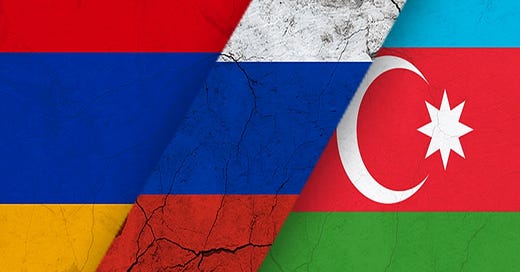Russia’s challenge is threefold since it must: 1) broker a sustainable peace deal between Armenia and Azerbaijan as soon as possible to preempt Yerevan’s “defection” from the CSTO on the pretext that this group is “non-functional”; 2) to which end Moscow must likely get Baku to agree to at least prolong the presence of Russian peacekeepers for the next few years; and 3) then ensure that Armenia still doesn’t “defect” from that bloc after it already gets what it wants from Russia.
Armenian Prime Minister Pashinyan proposed recognizing Azerbaijan’s territorial integrity in full in exchange for it doing the same to his country, though the caveat is that he’ll only do so if the security of local Armenians there is guaranteed. This naturally raises the question of how to satisfy his requirement in a way that’s also acceptable to Azerbaijan, with one possibility being to prolong the deployment of Russia’s peacekeepers there.
It can’t be taken for granted that Azerbaijan would approve of this for the extended period of time that Pashinyan appears to be implying is required to guarantee their safety, however, since it appears to be growing frustrated with the status quo. Azerbaijan only agreed to the presence of these forces in November 2020 because it expected that they’d expedite the removal of Armenian forces in parallel with facilitating the reasserting of the state’s sovereignty over the rest of its territory.
That outcome hasn’t yet materialized, and instead, these South Caucasus rivals have even clashed several times along their internationally recognized border. Armenia also accuses Azerbaijan of violating the same Moscow-mediated ceasefire that it agreed to after self-described “activists” blocked the Lachin Corridor, while Azerbaijan accuses Armenia of doing the same by still launching attacks from Karabakh. These factors have combined to make many worry about whether another war might soon erupt.
As a self-respecting state, Azerbaijan regards it as offensive for Armenia to hint that it can’t guarantee the security of its citizens, which includes those Armenians who’ve been in Karabakh since Soviet times but not those who moved to the region as colonists after its occupation by neighboring Armenia. Its rising confidence and regional prestige as a result of its victory two and a half years ago reduces the chances that Azerbaijan would agree to prolong the deployment of Russia’s peacekeepers.
Those calculations indirectly pose a problem for Russian-Armenian relations since Moscow must prove its military-security worth to Yerevan in order to prevent its “defection” from the CSTO, with the scenario of it prolonging the deployment of its peacekeepers in Azerbaijan being the best way to do so. Armenia surprised Russia by participating in joint NATO drills last month, which was followed by its Deputy Foreign Minister revealing this month that it contemplated leaving the CSTO last September.
Pashinyan added earlier this week that Armenia’s withdrawal might indeed still happen if it concludes that the CSTO has “become a non-functional organization”, which prompted Kremlin spokesman Peskov to promise that Russia will retain relevant dialogue with its partner in an effort to prevent this. The unstated threat that was just conveyed by Yerevan is that it’ll ditch the CSTO and thus deal a major blow to Moscow if Russia can’t convince Azerbaijan to guarantee the security of Armenians there.
In the event that Armenia “defects” from this Russian-led military-security bloc, then it would immediately raise questions about Moscow’s reliability to its other partners such as those in Central Asia, thus possibly emboldening those countries to distance themselves from it too like the West wants. With Armenia out of the CSTO, it might then apply for expedited entry into NATO, which could possibly lead to it and Georgia joining together like was supposed to be the case with Finland and Sweden.
Russia must therefore do its utmost to avert this dark scenario from unfolding, to which end it’s pressed to politically resolve the Armenian-Azerbaijani conflict once and for all as soon as possible before Yerevan’s patience runs out. That said, it wouldn’t be in Armenia’s best interests to ditch the CSTO until it gets what it wants since otherwise it’ll be without Russia’s protection if Azerbaijan and/or Turkiye decide to invade its internationally recognized territory in order to resolve this conflict on their own terms.
Nevertheless, it might end up being the case that Armenia could secretly reach an agreement with the US for the latter to extend security assurances to it prior to that country’s membership in NATO upon it formally announcing its withdrawal from the CSTO and intention to join that enemy bloc. The precedent for doing so was already established last May after the US gave exactly these sort of assurances to Finland and Sweden until they joined NATO, which is still relevant to the latter since it hasn’t yet done so.
Russia’s challenge is therefore threefold since it must: 1) broker a sustainable peace deal between Armenia and Azerbaijan as soon as possible to preempt Yerevan’s “defection” from the CSTO on the pretext that this group is “non-functional”; 2) to which end Moscow must likely get Baku to agree to at least prolong the presence of Russian peacekeepers for the next few years; and 3) then ensure that Armenia still doesn’t “defect” from that bloc after it already gets what it wants from Russia.
Each of these tasks presents a formidable challenge in and of themselves, let alone having to be tackled all at once due to Armenia hinting that it’ll dump the CSTO if it doesn’t get what it wants sometime soon, and not to mention that this is happening amidst Russia’s ongoing special operation. Even so, if there’s any country whose diplomats are capable of rising to the occasion, it’s Russia’s. This doesn’t mean that they’ll succeed, but just that nobody should doubt that they’ll give this their best shot.




